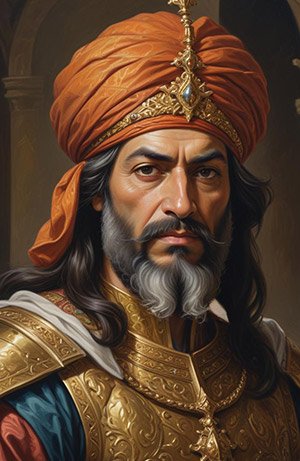Al'Akbar is the Baklunish demigod of dignity, duty, faithfulness, and guardianship. Ancient Baklunish is the language of Al'Akbar's faith.
Al'Akbar's faith is divided into two major sects, though smaller, more obscure sects exist among the Paynims. The Exalted Faith, based in Ekbir, is led by Caliph Xargun, while the True Faith, based in the Yatil Mountains and most popular in Ket, is headed by the Grand Mufti of the Yatils. The two sects split after the Cup and Talisman of Al'Akbar was stolen from its traditional place in Ekbir. The grand mufti was held responsible and exiled, where he started a rival faith, claiming the caliph was no longer the rightful spiritual leader.
The True Faith has a harsher, lawful neutral interpretation of Al'Akbar's dogma, emphasizing hard work, plain speech, and obedience, while the Exalted Faith is lawful good or neutral good, stressing rhetoric, diplomacy, and academic achievement.
Clerics of the Exalted Faith are known as qadi. Clerics of the True Faith are called mullahs. Both act as judges, ministers, scholars, teachers, healers, advisers, and guardians in their respective societies. Some are intolerant of the "infidels" who belong to non-Baklunish faiths. Wandering clerics of Al'Akbar search for the lost Cup and Talisman.
Paladins of Al'Akbar, known as Exalted Ones, work to lead by example, demonstrating by their words and deeds that faithfulness to and guardianship of the old traditions are the only correct path to revelation. They oppose the forces of darkness, seek to defend Baklunish traditions and people, and search for the Cup and Talisman of Al'Akbar.
Vestments
Clerics wear long white robes with a gold or purple trim, and no adornments. Males wear turbans, while females wear only simple white gold circlets.
Paladins wear billowing tunics that obscure their armor and conceal their faces. Their clothing is white or tan, often with gold or purple trim.
Rituals
Ritual prayers may be made at dawn or dusk. A ceremony known as the Procession of Blessing used to be performed using the Cup and Talisman of Al'Akbar, but this ended when the relics were stolen by elven raiders in 219 CY.
Orders
The farises are an order of Ekbiri knights in the service of Al'Akbar.
Al'Akbar's priests present his symbol as a metaphor for a righteous life. They teach their congregation to be filled with kindness, poured from and into others, and emblems of devotion. His relationship to his pantheon is treated as an example for his peoples' relationship to their superiors--to be dutiful, faithful and obedient. Al'Akbar teaches steadfastness and mercy, and opposes slavery.
Al'Akbar is depicted as a golden-skinned young Baklunish man with a neatly tended beard. He dresses as a paladin of his race, weilding a falchion.
Al'Akbar is subordinate to the other Baklunish gods, remaining a mere demigod out of respect for them. Despite this fact, the nations of Ekbir and Tusmit seem to place him before other gods.
His faithful oppose the sadistic elemental cults of Ull.
Al'Akbar is allied with Heironeous.
History
Al'Akbar was the most exalted high priest in what are now the lands of the Paynims. After the Invoked Devastation, during that time of misery and suffering, he was given the Cup and Talisman by Al'Asran to help heal his people's ills and return them to the traditional Baklunish faith.
Al'Akbar founded the city of Ekbir and, for the last decade of his mortal life, ruled the nation of Ekbir as the first of its caliphs. Eventually he had a mosque to himself built and allowed his followers to call on his name in their prayers. Soon after, he ascended to the heavens to take his place among the gods.


